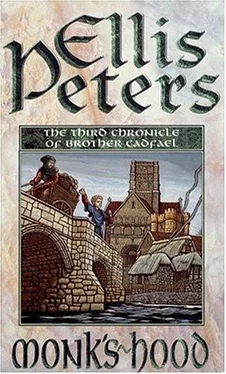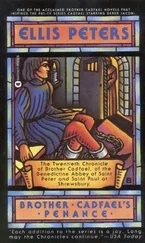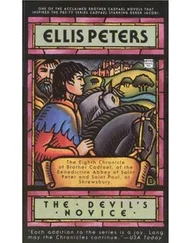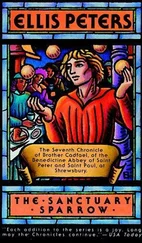Nevertheless, it had become a trial. Even with his admirable and terrible gallantry, he could not entirely prevent the entry of a note of defence. And he knew it, and was afraid, not for himself, for the object of his absorbing love, the land on which he had been born. Brother Cadfael was torn in a measure he had hardly expected. It was time to end it, with one fatal cast that might produce success or failure, for he could not bear this partition of his mind much longer, and Edwin was in a prison cell, something even Meurig did not yet know, something that might have reassured him if he had been aware of it, but no less might have moved and dismayed him. Never once, in that long afternoon of questioning, had Meurig sought to turn suspicion upon Edwin, even when the sergeant pointed the way.
“Draw out the stopper,” said Cadfael to the three judges, almost strident now in his urgency. “Note the odour, it is still strong enough to be recognised again. You must take my word for it that it was the means of death. And you see how it has run down the vial. It was stoppered in haste after the act, for all was then done in haste. Yet some creature carried this vial on his person for a considerable while after, until the sheriffs officers had come and gone. In this condition, oiled without as well as within. It would leave a greasy stain not easy to remove, and a strong smell—yes, I see you detect the smell.” He swung upon Meurig, pointing to the coarse linen scrip that hung at his belt. “This, as I recall, you wore that day. Let the judges themselves examine, with the vial in their hands, and see whether it lay within there an hour, two hours or more, and left its mark and its odour. Come, Meurig, unbuckle and give up your scrip.”
Meurig indeed dropped a hand to the buckles, as though stunned into obedience. And after this while, Cadfael knew, there might be nothing to find, even though he no longer had any doubts that the vial had indeed lain within there all that prolonged and agonising afternoon of Bonel’s death. It needed only a little hardihood and a face of brass, and the single fragile witness against Meurig might burst like a bubble, and leave nothing but the scattered dew of suspicion, like the moisture a bubble leaves on the hand. But he could not be sure! He could not be sure! And to examine the scrip and find nothing would not be to exonerate him completely, but to examine it and find the seam stained with oil, and still with the penetrating scent clinging, would be to condemn him utterly. The fingers that had almost withdrawn the first thong suddenly closed into a clenched fist denying access.
“No!” he said hoarsely. “Why should I submit to this indignity? He is the abbey’s man sent to besmirch my claim.”
“It is a reasonable requirement,” said the presiding judge austerely. “There is no question of your surrendering it to anyone but this court. There can be no suspicion that we have anything to gain by discrediting you. The bench requires you to hand it over to the clerk.”
The clerk, accustomed to having the court’s orders respected without demur, advanced trustingly, extending a hand. Meurig dared not take the risk. Suddenly he whirled and sprang for the open door, scattering the old men who had come to back his claim. In a moment he was out into the wintry light of the morning, running like a deer. Behind him uproar broke out, and half of those in the church poured out after the fugitive, though their pursuit was half-hearted after the first instinctive rush. They saw Meurig vault the stone wall of the churchyard and head for the fringes of woodland that clothed the hillside behind. In a moment he was lost to view among the trees.
In the half-deserted church a heavy silence fell. The old men looked at one another helplessly, and made no move to join the hunt. The three judges conferred in low and anxious tones. Cadfael stood drooping in a weariness that seemed temporarily to have deprived him of energy or thought, until at last he drew breath long and deeply, and looked up.
“It is not a confession, nor has there been a formal charge, or any suit as yet brought against him. But it is evidence for a boy who is now in prison at Shrewsbury on suspicion of this crime. Let me say what can and should be said for Meurig: he did not know Edwin Gurney had been taken, of that I am sure.”
“We have now no choice but to pursue him,” said the presiding judge, “and it will be done. But certainly the record of this court must be sent, out of courtesy, to the sheriff at Shrewsbury, and at once. Will that content you?”
“It’s all I ask. Send also, if you will, the vial, concerning which a novice by the name of Mark will testify, for it was he who found it. Send all to Hugh Beringar, the sheriff’s deputy, who is in charge, and deliver the report only to him, of your kindness. I wish I might go, but I have still work to do here.”
“It will take some hours for our clerks to make the necessary copies and have them certified. But by tomorrow evening, at latest, the report shall be delivered. I think your prisoner will have nothing more to fear.”
Brother Cadfael uttered his thanks, and went out from the church into a village thronging with agitated, head-shaking neighbours. The tale of the morning’s events was on the wing by now, surely already being carried over the hills throughout the commote of Cynllaith, but even rumour had not flown so fast as Meurig, for nothing was seen of him all that day. Cadfael led his horse from the paddock, and mounted and rode. The weariness that had fallen upon him when the need for effort ended so suddenly was subsiding slowly into a desperate sadness, and that again into a drear but grateful calm. He took the journey back very slowly, for he needed time to think, and above all, time for another to do some even more urgent thinking. He passed by the manor-house of Mallilie with only a rueful glance. The ending would not be there.
He was very well aware that it was not yet over.
“You are back in good time, brother,” said Simon, stoking the brazier with fresh fuel for the evening. “Whatever your business, I trust God prospered it.”
“He did,” said Cadfael. “And now it must be your turn to rest, and leave the remaining work to me. I’ve stabled and groomed and fed the horse, he’s not overdone for I took things gently with him. After supper there’ll be time for shutting the hen-house and seeing to the cow, and light enough still to bring down the ewes in lamb to the barn, for I think there may be harder frost in the night. Curious how the light lies in these hills a good half-hour longer than in the town.”
“Your Welsh eyes, brother, are only just regaining their proper vision. There are few nights here that a man could not travel safely even among the upland bogs, knowing the ground at all well. Only in the woods is it ever truly dark. I talked with a wandering brother from the north once, a rough red-haired man with a tongue I could barely understand, a Scot. He said in his far country there were nights when the sun barely set before it rose again on the other side, and you could see your way in an endless afterglow. But I do not know,” said Brother Simon wistfully, “if he was romancing. I have never been further than Chester.”
Brother Cadfael forbore from citing his own travels, remembered now with the astonished contentment of a man at rest. To tell the truth, he had enjoyed the storms no less than he now enjoyed the calm, if this was indeed calm: but each had its own time and place.
“I’ve been glad of this stay with you,” he said, and that at least was true “It smells like Gwynedd here. And the folk hereabouts have me speaking Welsh to them, and that’s gain, for I use it little enough in Shrewsbury.”
Brother Barnabas came with the supper, his own good bread, barley gruel, ewe’s-milk cheese and dried apples. He breathed without labour, and strode round the house unwearied and energetic. “You see I’m ready and able for work, brother, thanks to your skills. I could fold the ewes myself tonight.”
Читать дальше












